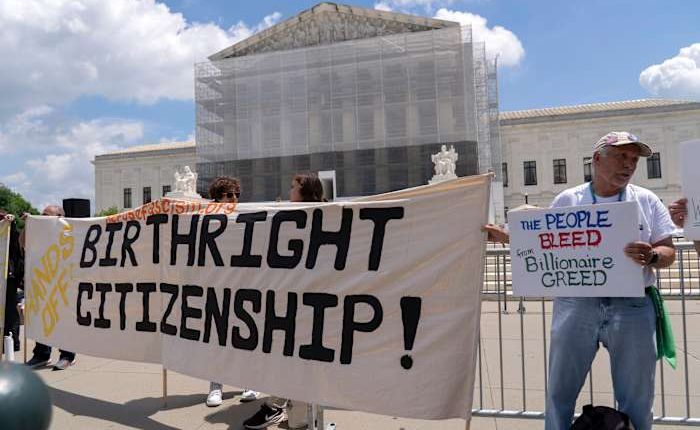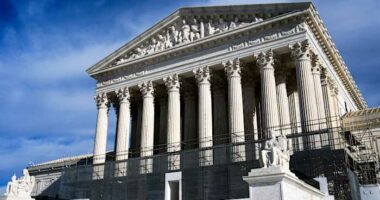Share this @internewscast.com

WASHINGTON – On Monday, a federal judge inquired about when the Trump administration plans to implement its executive order on birthright citizenship. The judge also questioned whether the government would attempt to deport U.S.-born children of individuals residing in the country either illegally or temporarily, before any restrictions on birthright citizenship begin in late July.
Brad Rosenberg, an attorney for the Justice Department, assured U.S. District Judge Deborah Boardman that the administration has no intention of deporting children protected by President Donald Trump’s executive order while the Supreme Court has temporarily halted its enforcement for 30 days. He described the concern as “hypothetical.”
The judge gave Rosenberg until Tuesday to provide a written explanation detailing the administration’s perceived authorities and limitations following the Supreme Court’s decision last Friday. She specifically asked if the government plans to target infants for deportation before July 26. Her inquiry pertained to children born post-Feb. 19, who are under Trump’s executive order but are not involved in any legal action contesting the order.
“No,” Rosenberg said. “I just want to be clear. I am responding to the court’s characterization of what it believes the United States might do after 30 days from the date of the Supreme Court’s decision. But, again, I would note that (federal agencies) have all been tasked with developing guidelines for implementation of the executive order. So I view that as a hypothetical.”
“I take the government at its word that the United States does not intend to do that and it is not doing that,” Boardman said.
Plaintiffs’ attorney William Powell said their clients are experiencing “incredible stress, anxiety and fear” after the Supreme Court’s decision.
“They’re not lawyers. It is confusing to them exactly what these things mean,” Powell told the judge. “We can’t really assure them, ‘Oh, no, the order is fully blocked,’ because it’s not.”
Powell said deportation isn’t the only “irreparable harm” that plaintiffs’ attorneys are concerned about.
“We’re obviously also concerned about other potential ways in which the (executive) order could be enforced to deprive newborns of potential rights,” he said.
Boardman, who sits in Greenbelt, Maryland, isn’t the only district court judge grappling with how to tailor their orders to comply with the Supreme Court decision written by Justice Amy Coney Barrett. Judges in Massachusetts and Washington state have issued a a separate orders on birthright citizenship, as has a judge in New Hampshire, though that order applied more narrowly and wasn’t nationwide.
New Jersey Attorney General Matt Platkin, who along with other states and cities brought a case in Massachusetts federal court, said in a letter Monday he was seeking a hearing on whether a nationwide order blocking the president is warranted. Platkin said the nationwide injunction in New Jersey’s case doesn’t run afoul of the Supreme Court’s recent opinion but added the high court offered “alternative forms of relief” while leaving debate over what those could be to lower courts.
The high court’s majority ruled that federal judges lack the authority to grant nationwide injunctions, but the decision left unclear whether Trump’s executive order on birthright citizenship could soon take effect in parts of the country.
Birthright citizenship automatically makes anyone born in the United States an American citizen, including children born to mothers in the country illegally. The right was enshrined soon after the Civil War in the Constitution’s 14th Amendment. The U.S. is among about 30 countries where birthright citizenship is applied.
Trump and his supporters have argued that there should be tougher standards for becoming an American citizen.
___
Associated Press writers Mark Sherman and Mike Catalini contributed to this report.
Copyright 2025 The Associated Press. All rights reserved. This material may not be published, broadcast, rewritten or redistributed without permission.










